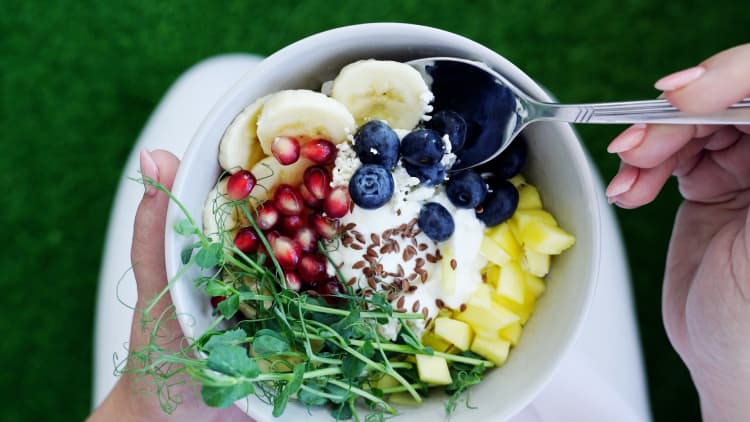The American Academy of Sleep Medicine recommends that adults get more than seven hours of sleep each night, but that's not always in the cards for everyone — and it's easy to feel guilty about it.
But as a Harvard-trained medical doctor, I often remind people that we all have busy lives, so it's not worth stressing if you can't get a full seven hours every night.
Plus, each person is different. My advice is to let your body tell you how much sleep you need.
Hidden signs you're not getting enough sleep
If you answer yes to three or more of these 10 statements, then you likely aren't getting enough sleep or good-quality sleep:
- It takes you 30 minutes or more to fall asleep at bedtime.
- You rarely remember your dreams.
- You wake up in the morning still feeling tired and not very rested.
- You feel hungry more often, especially for junk food.
- You wake up earlier in the morning than you would like to.
- You sometimes feel sleepy and tired throughout the day.
- You frequently wake up one or more times during the night.
- You often lie awake at night, and your mind races with worry and other thoughts.
- Your eyes are puffy or red, or you have dark circles or bags under them in the morning.
- Your emotions are all over the map — anger, impulsivity, anxiety, sadness, and so forth.
5 things I do to wake up well-rested
Ideally, I aim for at least two good nights of sleep when life gets busy. This gives my body time to complete one full sleep cycle. Not only that, but I'm not so groggy when I wake up.
1. I go to bed and wake up at the same time every day, including weekends.
Although the exact times may vary, I am generally in bed between 9 p.m. and 10 p.m., and wake up between 5:30 a.m. and 7 a.m.
Even on weekends, I naturally wake up at the same time. If you synchronize your sleeping and waking schedules like this, you will, too.
For those fun nights out, I'll still wake up at my usual time, then fit in a quick 20-minute nap later in the day so I'll have extra energy for going on.
2. I cut back on cortisol-triggering foods.
Certain foods throw your cortisol out of balance, which means it can get high and night when it needs to be low so you can sleep well.
Try to limit animal proteins, refined sugars, salt and saturated fat. They all stimulate an over-release of cortisol.
Diets rich in fruits and vegetables, on the other hand, can promote the healthy cortisol production rhythms needed for sound sleep.
3. I avoid coffee, alcohol and nicotine.
Studies suggest that an evening cup of coffee alters your circadian rhythm at a cellular level, so try to avoid it after noon. If you need a beverage before bedtime, go for a glass of warm milk or decaffeinated tea.
Because it's a sedative, alcohol can make you sleepy at first but ultimately leads to disrupted sleep as liver enzymes metabolize it.
Nicotine is also a stimulant. Research shows that people who smoke or vape often sleep for a shorter amount of time, with irregular sleep patterns.
4. I keep my bedroom cool.
Cool temperatures of 60 to 68 degrees Fahrenheit are close to our own internal body temperature (which drops to its lowest level when we sleep) are the best for sleeping.
Anything above or below this range can breed restless sleep. Taking a cold shower can help cool down the body before bed, too.
5. I work out earlier in the day.
Exercise increases the overall amount of time you spend in slow-wave sleep, the most restorative kind. This is partly because it tires you out! After you've exercised, your body wants to recover, and sleep is a good way of doing that.
That said, I caution against exercising at night or close to bedtime. By energizing your body, exercise raises your core body temperature, which is the opposite of what you want to have happen before going to sleep.
Your body temperature naturally lowers in the evening, a signal to your brain that it's time to snooze.
Dr. Amy Shah, MD, is a double board-certified medical doctor and nutritionist specializing in food allergies, hormones and gut health, with training from Cornell, Columbia and Harvard. She is also the author of "I'm So Effing Hungry: Why We Crave What We Crave, and What to Do About It." Follow her on Instagram.
Don't miss:
- Harvard psychologist: If you use any of these 9 phrases every day, 'your relationship is more successful' than most
- I spent 10 years studying what makes us happy in life—here's the No. 1 thing I overlooked the entire time
- I'm a nutritionist from Japan, home to the world's longest-living people: 5 longevity foods we eat every day

Want to be smarter and more successful with your money, work & life? Sign up for our new newsletter!


